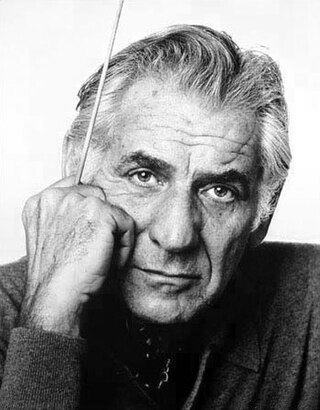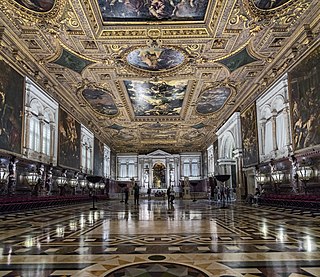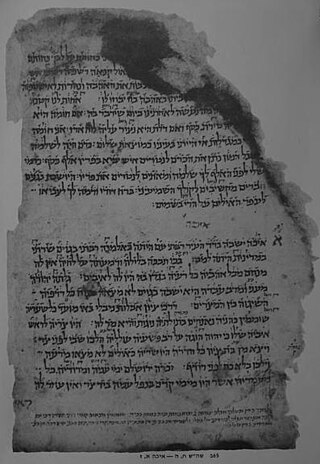
Leonard Bernstein was an American conductor, composer, pianist, music educator, author, and humanitarian. Considered to be one of the most important conductors of his time, he was the first American-born conductor to receive international acclaim. Bernstein was "one of the most prodigiously talented and successful musicians in American history" according to music critic Donal Henahan. Bernstein's honors and accolades include seven Emmy Awards, two Tony Awards, and 16 Grammy Awards as well as an Academy Award nomination. He received the Kennedy Center Honor in 1981.

A jeremiad is a long literary work, usually in prose, but sometimes in verse, in which the author bitterly laments the state of society and its morals in a serious tone of sustained invective, and always contains a prophecy of society's imminent downfall.
Serenade to Music is an orchestral concert work completed in 1938 by English composer Ralph Vaughan Williams, written as a tribute to conductor Sir Henry Wood. It features an orchestra and 16 vocal soloists, with lyrics adapted from the discussion about music and the music of the spheres from Act V, Scene I from the play The Merchant of Venice by William Shakespeare. Vaughan Williams later arranged the piece into versions for chorus and orchestra and solo violin and orchestra.

Symphony No. 3 "Kaddish" is a programmatic choral symphony by Leonard Bernstein, published in 1963. It is a dramatic work written for a large orchestra, a full choir, a boys' choir, a soprano soloist and a narrator. "Kaddish" refers to the Jewish prayer that is chanted at every synagogue service for the dead but never mentions "death."
The Lamentations of Jeremiah the Prophet have been set by various composers.
Brian Elias is a British composer.

Leonard Bernstein's Symphony No. 2 The Age of Anxiety is a piece for orchestra and solo piano. The piece was composed from 1948 to 1949 in the United States and Israel, and was revised in 1965. It is titled after W. H. Auden's eponymous poem, and dedicated to Serge Koussevitzky.

Felicia Montealegre Bernstein was an American actress born in Costa Rica.

Alisa Weilerstein is an American classical cellist. She was named a 2011 MacArthur Fellow.
Nancy Maultsby is an American operatic mezzo-soprano.

Rachel Kolly, born 21 May 1981 in Lausanne, Switzerland, is a Swiss violinist. Considered a child prodigy at the violin, she started playing at the age of five.

Oedipus rex is an opera-oratorio by Igor Stravinsky, scored for orchestra, speaker, soloists, and male chorus. The libretto, based on Sophocles's tragedy, was written by Jean Cocteau in French and then translated by Abbé Jean Daniélou into Latin; the narration, however, is performed in the language of the audience.
Betty Olivero is an Israeli music educator and composer.
Wendy White is an American mezzo-soprano who has had an active international singing career in operas and concerts since the late 1970s. She has performed annually with the Metropolitan Opera since her debut with the company in 1989, and as of April 2011 has appeared in a total of 505 performances at the Met.

Threni: id est Lamentationes Jeremiae Prophetae, usually referred to simply as Threni, is a musical setting by Igor Stravinsky of verses from the Book of Lamentations in the Latin of the Vulgate, for solo singers, chorus and orchestra. It is Stravinsky's first and longest completely dodecaphonic work, but is not often performed. It has been called "austere" but also a "culminating point" in his career, "important both spiritually and stylistically" and "the most ambitious and structurally the most complex" of all his religious compositions, and even "among Stravinsky's greatest works".

Mohammed Fairouz is an American composer.
Charlotte Bray is a British composer. She was championed by the Royal Opera House Covent Garden, London Sinfonietta and Birmingham Contemporary Music Group, BBC Symphony Orchestra. Her music has been performed by many notable conductors such as: Sir Mark Elder, Oliver Knussen, Daniel Harding, and Jac van Steen.
Frank Bencriscutto, nicknamed "Dr. Ben," was an American conductor and composer of concert band music. Bencriscutto was Director of Bands and Professor of Music at the University of Minnesota for thirty-two years.

Lamentations 1 is the first chapter of the Book of Lamentations in the Hebrew Bible or the Old Testament of the Christian Bible, part of the Ketuvim ("Writings").

I Hate Music: A cycle of Five Kid Songs for Soprano and Piano is a song cycle by Leonard Bernstein. Composed in 1942, the work was premiered by vocalist Jennie Tourel with Bernstein as pianist in 1943. The song has remained a part of the song repertoire and has been recorded by numerous artists; including singers Blanche Thebom, Barbara Bonney, Harolyn Blackwell and Roberta Alexander among others.












